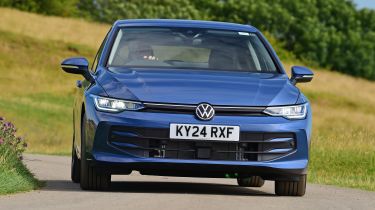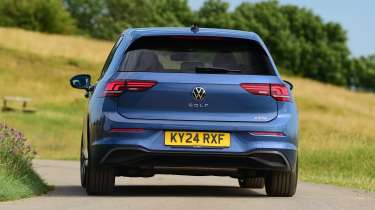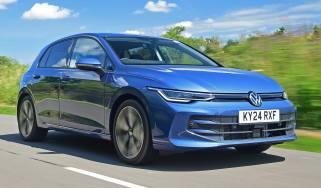Volkswagen Golf review - Engines, drive & performance
"The Volkswagen Golf maintains its careful balance between comfort and fun"
How the Golf drives depends heavily on the trim level and engine, because while entry-level versions get a simple torsion bar rear suspension, pricier Golfs swap this for a more advanced type of independent suspension that’s better able to deal with challenging roads. Buyers can also order Dynamic Chassis Control, which includes adaptive suspension and Eco, Comfort, Sport and Individual driving modes so you can adjust how the car behaves.
Comfort makes the steering too vague, while Sport makes the suspension slightly too firm for a normal hatchback, so cherry-picking the best setup is a big positive. Concentrate really hard and the Mk8 feels slightly more agile than the Mk7 on its standard suspension, with a fraction less body lean in corners and a keener steering response. However, the trade-off is a slightly less compliant feel over rough surfaces.
The Golf is excellent at higher speeds, particularly on the motorway, where very little effort is required of the driver to keep it in the middle of its lane at 70mph.
Volkswagen Golf petrol engines
There's certainly no lack of choice in the engine department. The 1.5-litre TSI (113bhp or 148bhp) engine has evolved slightly from the Mk7 Golf, and now replaced the 1.0-litre TSI with 108bhp that was available in pre-facelift cars. This can be had with a six-speed manual on entry-level Life cars, while you get the option of a seven-speed automatic on Style cars, which also adds mild-hybrid eTSI tech.
More reviews
Car trim reviews
In-depth reviews
- Volkswagen Golf R review – the ultimate hot Golf
- Volkswagen Golf review - the go-to family hatchback
- Volkswagen Golf R estate review
Used car reviews
Even the entry-level 1.5-litre petrol feels like it holds an advantage over the 1.0-litre EcoBoost found in the Ford Focus and the Vauxhall Astra’s 1.2-litre engine. It’s the only four-cylinder of the trio, which helps it deliver power smoothly and from low revs, with very little noise or vibration.
Acceleration from 0-62mph takes around 8.4 seconds in the 148bhp eTSI, and unlike many mild-hybrids we've tried, you can feel the system boosting performance when pulling away. The engine cuts in and out smoothly, and at higher speeds the transition is barely noticeable. Here, the DSG gearbox is also the best it's been, with the electric motor helping smooth its shifts to the point it almost feels like a conventional automatic at all but the lowest manoeuvring speeds.
Diesel engines
There's just one diesel in the latest Golf – a new version of the 2.0-litre TDI, with either 113 or 148bhp (R-Line and above) and extra technology to reduce exhaust emissions. We've tried the latter and found it impressively smooth; it may very well be more refined than the 1.5-litre eTSI under acceleration. The extra 20Nm of torque versus the old engine isn’t really noticeable, but it feels punchy and works well with the DSG automatic gearbox.
Hybrid engines
The plug-in hybrid Golf is now available in two flavours. The more affordable eHybrid in Match and Style trim pairs a 1.5-litre petrol engine with an electric motor for a combined 201bhp. This can get it from 0-62mph in 7.2 seconds.
There’s an even punchier version in GTE trim which has some impressive stats. It boasts 268bhp, which is actually a little more than that of a Golf GTI, propelling it from 0-62mph in just 6.6 seconds. It does weigh more than a GTI, though, so it’s not quite as sporty to drive, but it’s a great in-between if you want to balance performance with low running costs.
Which Is Best?
Cheapest
- Name1.5 TSI Life 5dr
- Gearbox typeManual
- RRP£27,790
Most Economical
- Name1.5 TSI 204 Match eHybrid 5dr DSG
- Gearbox typeSemi-auto
- RRP£36,170
Fastest
- Name2.0 TSI 333 R 4Motion 5dr DSG
- Gearbox typeSemi-auto
- RRP£44,565














